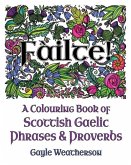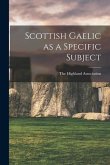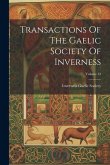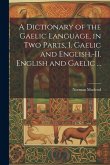This book examines where Gaelic stands within the family of European languages, tracing its roots to Indo-European languages and showing how firmly it is established within them, rather than being a strange, unrelated outlier. He uses his knowledge of several modern and ancient languages to show the links between them, and to demonstrate the roots of Gaelic in particular. This book will help anyone interested in the history of Scots Gaelic to understand its place within this family of languages, and will be of interest to both the learner and the more experienced reader.
Hinweis: Dieser Artikel kann nur an eine deutsche Lieferadresse ausgeliefert werden.
Hinweis: Dieser Artikel kann nur an eine deutsche Lieferadresse ausgeliefert werden.





![The Gaelic Bards From 1825 to 1875 [microform] The Gaelic Bards From 1825 to 1875 [microform]](https://bilder.buecher.de/produkte/65/65585/65585760m.jpg)


